May 19, 2025 | 22:27 GMT +7
May 19, 2025 | 22:27 GMT +7
Hotline: 0913.378.918
May 19, 2025 | 22:27 GMT +7
Hotline: 0913.378.918
During the peak planting season for the autumn-winter rice crop of 2024, the community agricultural extension group in Thanh Phuoc commune (Giong Rieng district, Kien Giang province) is perpetually involved in implementing a variety of models and conducting field visits to safeguard production. The group conducts a weekly briefing to allocate responsibilities, following which the members implement their assigned responsibilities in the designated area.
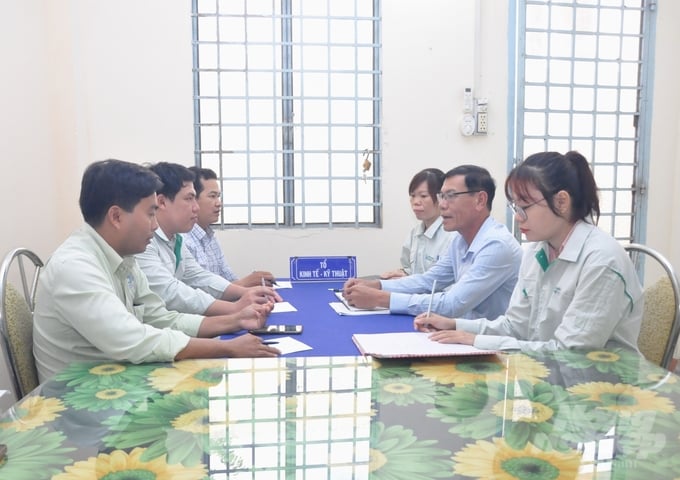
The Thanh Phuoc commune community agricultural extension team held a meeting to assign tasks, then members were assigned to work closely with the area. Photo: Trung Chanh.
According to Mr. Do Van Dong, vice chairman of the commune's people's committee and deputy head of the community agricultural extension group of Thanh Phuoc commune, the commune is implementing a plan to construct a new model rural area in 2024, which necessitates a significant amount of labor. The agricultural extension force is responsible for implementing criterion number 13 regarding production organization.
Mr. Dong reports that Thanh Phuoc commune has 3,510 hectares of productive land, with approximately 85% dedicated to triple-crop rice production. The remaining land is used for cultivating fruit plantations, including durian, custard apple, longan, mango, various vegetables, and lotus cultivation. The community agricultural extension group actively mobilizes farmers to participate in large fields, develop collective economies, and train them to transmit scientific and technical knowledge to promote production development.
The agricultural extension force recommends that farmers adhere to the correct seasonal calendar, clean fields, space crops to isolate pathogens, and collect pesticide packaging for processing to protect the environment for the autumn-winter rice crop 2024, in addition to building production development models. In particular, the extension force must frequently collaborate with farmers to inspect fields, advise of diseases, and proactively take measures to prevent natural disasters and flooding that could impact the fields, as this crop is grown during the rainy and stormy season.
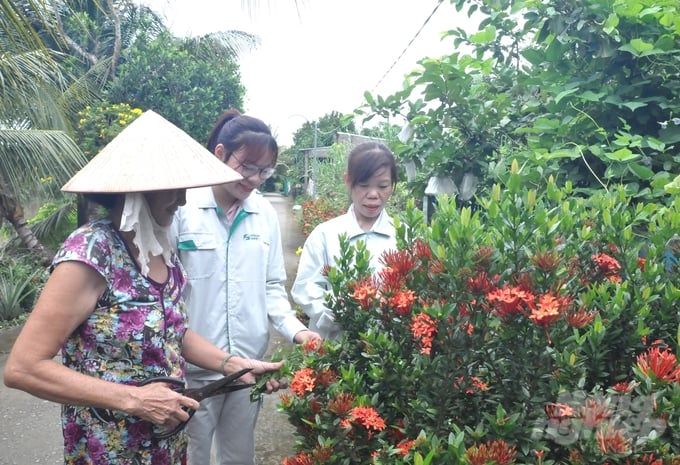
Members of the Thanh Phuoc Commune Community Agricultural Extension Team and local people plant and trim ornamental flowers and create beautiful green roads and alleys to construct a model new rural commune. Photo: Trung Chanh.
Mr. Nguyen Thuong Anh, the head of the community agricultural extension group, stated that the extension force improves support for production development, aligns with crop restructuring, and employs high-tech production by implementing the coordination regulations between agricultural extension and the commune government. The force also trains and assists residents in expanding and developing effective agricultural production models on a local scale and establishes connections between product consumption and purchasing and processing enterprises.
Developing extra forms of commerce and garden ecotourism to generate employment opportunities and fortify the production linkage through cooperative economic structures like cooperative groups and cooperatives. Increasing residents' income by implementing effective business models such as beef cattle farming, eel farming, and fish farming in rice fields. The objective is to achieve a 10% increase in the average income in 2024 compared to the previous year, to exceed 79 million VND per individual per year to satisfy the income criteria of the new model rural commune.
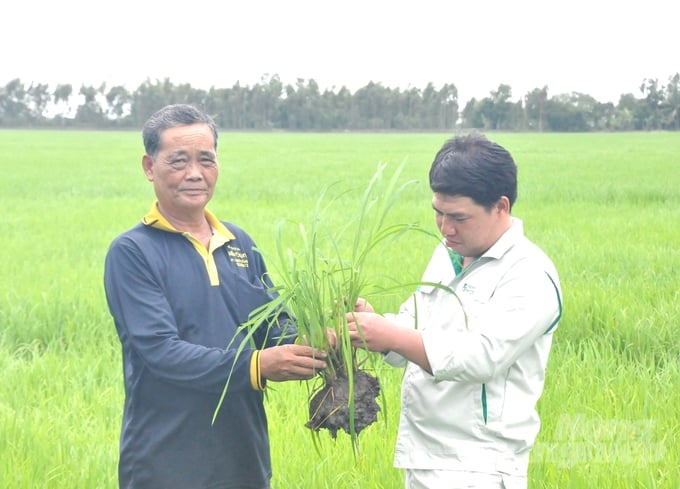
The Thanh Phuoc commune community agricultural extension team staff always work closely with farmers to implement models and regularly visit fields to protect production. Photo: Trung Chanh.
According to Mr. Do Van Dong, Thanh Phuoc has selected the most prominent areas of production organization, education, culture, tourism, healthcare, environment, security and order, and digital transformation to achieve achievements and meet the criteria for a new model rural commune. Numerous of these regions are associated with the responsibilities of the community agricultural extension group.
The commune steering committee and the district steering committee have mutually consented to concentrate on two areas for implementing the criteria for a new model rural commune: production organization and education-training, following a thorough review and analysis of the commune's most influential areas.
The commune's production organization is facilitated by numerous rice export enterprises, milling factories, drying kilns, and agricultural material businesses in and around the area. This facilitates the signing of agreements to consume the commune's primary products, resulting in over 50% of the output. Thanh Phuoc also has many potential products and numerous effective agricultural production models, and it is participating in the OCOP program to assist in increasing residents' incomes.
Mr. Le Hoai, the Head of the Agricultural Extension Station in Giong Rieng district, stated that the station immediately organized and promoted the plan for innovations in agricultural extension work and restructuring organizational activities after the decision to establish community agricultural extension groups. Currently, the district of Giong Rieng has established 19 community agricultural extension organizations, encompassing 18 communes and one town, and has 103 members.
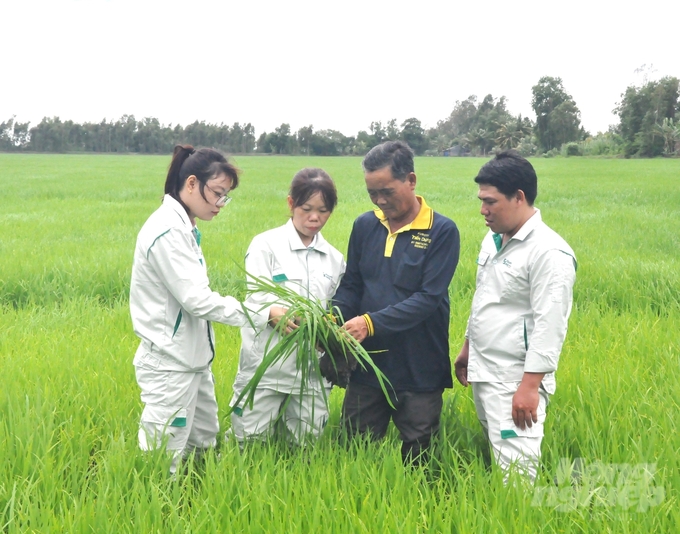
Giong Rieng district has established 19 community agricultural extension groups with 103 members. Photo: Trung Chanh.
Each group always has a vice chairman of the commune People's Committee in charge of production. This individual functions as the deputy head of the community agricultural extension group, ensuring that the government and agricultural extension activities are coordinated seamlessly.
In the past two years, the community agricultural extension groups have successfully conducted activities, including transmitting technical knowledge and scientific advancements to farmers, cooperatives, and production cooperative groups. This was achieved through the conduct of 40 training classes attended by hundreds of participants. Over 3,600 individuals have received market linkage consultation from them, including farmers, cooperatives, and production cooperative organizations.
Members of the community agricultural extension groups have consistently collaborated with cooperatives and production cooperative groups to conduct field visits, providing recommendations on crops, livestock diseases, and pest and disease conditions. They persist in developing and innovating novel agricultural production organization structures, thereby fortifying and improving cooperative operations following the Cooperative Law of 2012. To encourage business investment in rural and agricultural areas, they have implemented new high-efficiency production linkage models and expanded successful production development models.
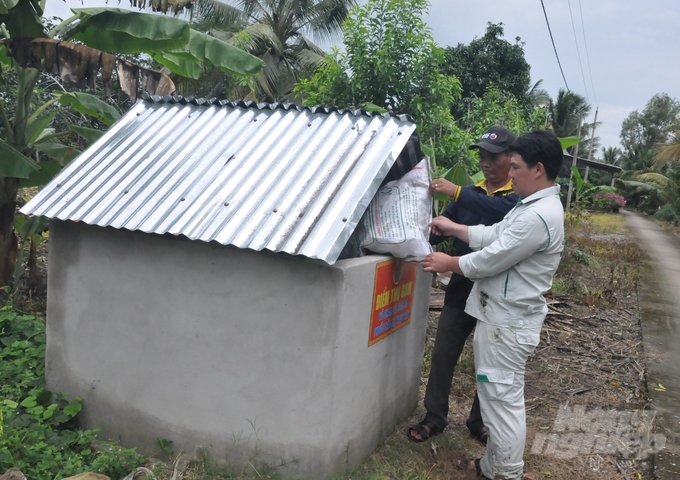
Staff of the Thanh Phuoc commune community agricultural extension team and farmers collect used pesticide packaging for treatment to protect the rural environment. Photo: Trung Chanh.
They have collaborated with the Steering Committee for Innovation and Development of the Collective Economy and Cooperatives to provide consultation and support for establishing three new cooperatives, bringing the total number of cooperatives in the district to 84. These cooperatives have nearly 9,500 members and nearly 12,000 hectares of production area. They have collaborated with the commune People's Committee to execute the Livelihood Diversification and Poverty Reduction Model Development Project as part of the National Target Program for Sustainable Poverty Reduction.
In 2023, they collaborated with corporations and companies to provide direct guidance to regional producers, identifying material areas for product off-take agreements in the district. In addition, they conducted eight training sessions on issuing and administering codes for agricultural product growing areas for export in various locations in conjunction with the Plant Protection Station. The district issued 84 codes for expanding areas in 2023.
Translated by Linh Linh

(VAN) As a doctoral student doing research on renewable energy and electrification at Harvard University, the author shares his musings on electricity, nature, and countryside memories.

(VAN) The decree on Extended Producer Responsibility (EPR) ensures transparent management and disbursement of support funds, avoiding the creation of a “give-and-take” mechanism.

(VAN) Hue City rigorously enforces regulations regarding marine fishing and resource exploitation, with a particular emphasis on the monitoring of fishing vessels to prevent illegal, unreported, and unregulated (IUU) fishing.

(VAN) Hanoi People's Committee has issued a plan on reducing greenhouse gas emissions in the waste management sector with 2030 vision.

(VAN) Vietnam's draft amendment to Decree No. 156 proposes a mechanism for medicinal herb farming under forest canopies, linking economic development to population retention and the sustainable protection and development of forests.

(VAN) In reality, many craft village models combined with tourism in Son La have proven effective, bringing significant economic benefits to rural communities.

(VAN) The international conference titled Carbon Market: International experiences and recommendations for Vietnam was successfully held recently in Ho Chi Minh City.